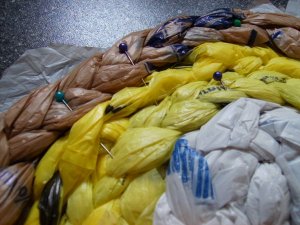Jules
SF VIP
Before we were prohibited from using our own bags during Covid, I barely had a plastic bag in the house. Now I don’t know what to do with all of them. There never was a program for returning them to the store and they can’t be put out with the recycling. A couple of my favourite charity stores had been desperate for any bags you could give them. Now they can’t take them for the sake of their staff and volunteers.
Only one store that I know of sold a paper bag for 10 cents vs the 5 for a plastic.
Now we’re allowed to bring our own bags back but can’t put them on the counter. We must pack them ourselves. That’s reasonable. The staff have enough to deal with.
Only one store that I know of sold a paper bag for 10 cents vs the 5 for a plastic.
Now we’re allowed to bring our own bags back but can’t put them on the counter. We must pack them ourselves. That’s reasonable. The staff have enough to deal with.


